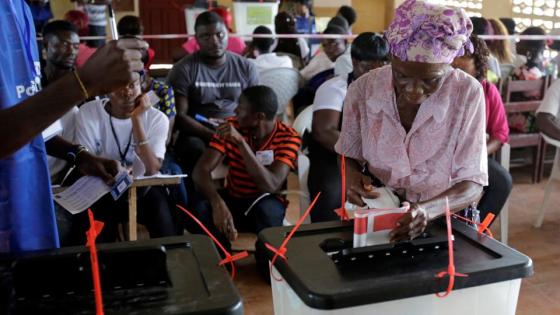Enjoining Issues with US Ambassador Michael McCarthy

In a region beset by seemingly intractable political problems, Liberia stands out for “exhibiting appreciable democratic practices, one of which is the conduct of free, fair and peaceful elections amid political outrage in West Africa”, according to US Ambassador Michael McCarthy.
This newspaper could not agree more with the Ambassador’s observation that despite the problems, “Liberia continues to remain an example to its neighbors” apparently for holding peaceful and successful elections but more importantly for having an abiding faith in democratic elections.
For the record, this achievement, of which the US Ambassador speaks in glowing terms, has come at a cost. It must be noted that Liberia underwent a long period (27 years) of despotic rule under President William V. S. Tubman, which served to deeply entrench a culture of impunity and fear.
But Tubman was feared and hated by the opposition, whose critical views of governance under his rule invoked repressive and very heavy-handed measures directed against the political opposition.
The 1955 so-called coup plot allegedly hatched by opposition politician Samuel David Coleman was, according to some historians, aimed at silencing the opposition.
Hundreds of his supporters were rounded up, tried under questionable circumstances and handed long jail sentences at the notorious BTC Post Stockade and Bella Yella.
Some, like Booker T. Bracewell, died in the Bella Yella Prison while others, like Cllr. Billy Horace, languished in prison until reprieved by President William Tolbert, following the death of President Tubman at a London clinic in 1971.
But prior to 1955, a watershed moment was observed in Liberian history with the election in 1870 of Edward James Roye as President, thus ending a prolonged period of mulattto domination. But less than two years later Roye was overthrown in a bloody coup d’etat, following accusation and charges that he had embezzled loan funds intended for Liberia.
Fast forward to the 1920s, the settler dominated True Whig Party, led by President Charles Dunbar Burgess King, conducted elections in 1927, the results of which have gone down in the Guinness Book of Records as the most fraudulent in history.
King was subsequently forced to resign under a host of accusations by the then League of Nations, suggesting his involvement in forced labor practices.
Historically, major constraints, especially the Property Clause, requiring voters to own property in fee-simple, served to exclude the vast majority of the citizenry from participation in national political life. Women especially were denied the right to vote and it was not until 1947 that women were granted the right of suffrage.
At the time of President Tubman’s death in 1971 and up to the 1980 military coup, the Property Clause requirement was still on the books.
A new Constitution in which the Property Clause had been dropped was adopted in 1986 in a referendum followed by multiparty elections, although some parties were banned from participation.
The 1986 election was virtually the first real democratic election since independence in 1847. Opposition politician Jackson Doe of the Liberia Action Party (LAP) was widely perceived and believed to have won the elections.
In the final analysis, incumbent military ruler Samuel Doe claimed victory against ample evidence of vote rigging and fraud perpetrated by Doe’s National Democratic Party of Liberia (NDPL).
And he was supported by the US government whose Secretary of State, George Shultz, declared the elections were “free and fair by African standards”. This action created widespread feelings of national ill-will against the Doe government. Only a month later, in November 1985, General Thomas Quiwonkpa launched an abortive invasion with the intent to overthrow the government.
Fast forward, Liberia lapsed into civil war in December 1989 nearly five years following the tragic events of 1985. After a prolonged 14-year civil war, calm was finally restored in 2003. Elections followed in 2005, which saw the election of Liberia’s and Africa’s first elected female president.
Since 2005 Liberia has held three successful presidential elections although not controversy- and tension-free. Nevertheless, Liberians have maintained the peace owing largely to the bitter experience of a 14-year civil war.
Over the last fifteen (15) years, Liberians have come to embrace democratic elections as the right and proper way to effect political change. The United States of America, as our oldest ally, should encourage this trend by supporting efforts to ensure transparency and accountability in the voting process.
It can no longer afford to lend support to autocratic regimes which, by their conduct, inevitably invokes popular resistance that is usually met by force or even provokes direct military intervention in politics.
In this regard, the experience of recent Representative by- elections as well as the senatorial elections, which were characterized by fraud and violence, should prove instructive.
For example, there is violence ongoing in Grand Cape Mount County, despite the elections having long since ended. And it is perpetrated mainly by supporters of this government, according to sources.
As the nation approaches the 2023 presidential elections, the signs do not look good. For example, a compromised Voters Registry (VR) is still in use although the Supreme Court has since 2017 ordered its clean-up.
Moreover, the composition of the national electoral body remains an issue of concern with some commissioners having known ties to the ruling establishment, while another has previously been found guilty of fraud when he served as data officer at that same body.
If Liberia is to indeed remain an oasis of hope and democratic practices in a region threatened by autocratic tendencies and practices, the US must play a more constructive and assertive role by supporting the Liberian people in their quest for responsible, and accountable democratic governance through free, fair and democratic elections and not those elections which are “fair by African Standards”, as once described by US Secretary of State George Shultz.

